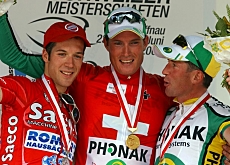
Phonak suspends another rider over doping

Switzerland's Phonak cycling team has suspended Swiss rider Sascha Urweider following a positive test for high levels of testosterone.
If confirmed by an additional test, the news will be a blow for the team, which has been hit by a series of doping scandals in the last two years.
According to a statement released on Monday, Phonak was informed by Swiss Cycling, the Swiss national cycling association, that a test carried out on February 14 on Urweider had been positive.
In keeping with Swiss-based International Cycling Union (UCI) guidelines, Phonak said it was suspending 25-year-old Urweider immediately, but would wait for the so-called B-test before deciding on further action.
Urweider, who has been with Phonak since 2004, has blamed the result on a dietary supplement he was using.
“I obtained the supplement from Germany through the internet,” he said, adding that its manufacturer had guaranteed that it did not include any banned substances.
“If the B-test is positive, I will definitely have the supplement investigated.”
Prior to the latest announcement, Phonak had gone 16 months without a positive confirmed doping check. In August 2005 Italian rider Fabrizio Guidi failed an initial test for the endurance-boosting hormone EPO, but was later cleared.
Doping scandals
In 2004 the team was hit by three positive controls, leading the UCI to threaten it with expulsion from the newly-formed Pro Tour.
American rider Tyler Hamilton, who won the time trial gold medal at the 2004 Athens Olympics, was the most high-profile case. Having tested positive for blood doping, he was sacked from the team and given a two-year ban.
Spanish colleague Santiago Perez failed tests for the same method, and former road world champion Oscar Camenzind was forced to end his career after a positive EPO test.
In September 2005 the team also fired Spanish rider Santos Gonzalez after the two-time national champion returned inconsistent blood levels in international team checks.
The dismissal was seen as evidence of Phonak’s tough new stance on medical irregularities, especially as Gonzalez had not exceeded UCI levels. Gonzalez maintains his innocence.
2005 also saw two Phonak officials resign after the UCI refused to give the team a licence for the year because of its doping record.
Phonak appealed and got a two-year licence in February last year.
swissinfo with agencies
2004: Tyler Hamilton – blood doping
2004: Santiago Perez – blood doping
2004: Oscar Camenzind – EPO
The Swiss-based International Cycling Union (UCI) has launched an ongoing medical monitoring programme which covers the majority of riders in competitions included in the UCI calendar.
The UCI complies with the requirements of the World Anti-doping Code. Tests are also carried out out-of-competition.
Any rider who uses a banned substance or method runs the risk of a two-year ban for a first offence. A second violation could result in a life-time ban.

In compliance with the JTI standards
More: SWI swissinfo.ch certified by the Journalism Trust Initiative




























You can find an overview of ongoing debates with our journalists here . Please join us!
If you want to start a conversation about a topic raised in this article or want to report factual errors, email us at english@swissinfo.ch.